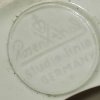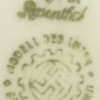Philipp Rosenthal started doing business in the porcelain industry in 1884 roku in Erkersreuth situated near Bavarian Selb. In the beggining he was buying Hutschenreuther whiteware. These items were then decorated by his wife Maria and sold door to door.
Already in 1891 r., because of porcelain shortage in the market, Rosenthal established his first factory in the Bohemian town called Asch. Produced there whiteware were subsequently painted and decorated in Rosenthal's workshops. Until mid 1930s. Rosenthal overtook factories: Kronach, Marktredwitz (with Thomas brand), Selb, Waldenburg, Sophienthal and Waldershof.
In 1910 and 1920 artistic ceramic divisions were opened.
Philipp Rosenthal was a Jew. In the second half of 1934 situation in Germany was so tense that he lost control of his business. In 1935 he was forced to leave Germany and died in 1937.
The factory continued operations during the WWII. Philip Rosenthal, son of the founder, was fighting Nazi Germany. After the win he returned to Germany trying to regain control. He suceeded only in 1950.
Under Rosenthal junior management the company swiftly recovered. Philip hired the bes artists as Bjorn Wiinblad from Denmark, Hans Theo Baumann from Germany, Raymond Peynet from France and Tapio Wirkkala z Finland. In 1979 when the company was closing to the 100th anniversary, it hired around 8500 workers.
In 1997 Waterford Wedgwood plc took control of Rosenthal. Part of the group became Hutschenreuther in 2000.
Financial problems of Waterford Wedgwood made that in 2009 Rosenthal was bought by Italian Sambonet. The company is now traded as Rosenthal GmbH.


